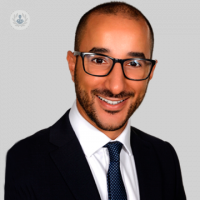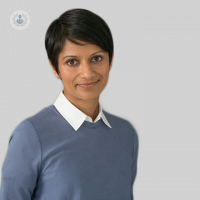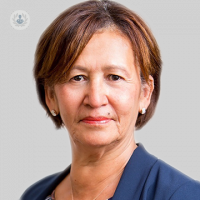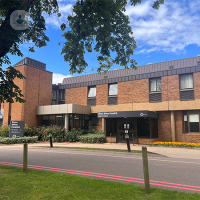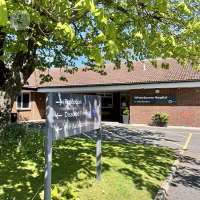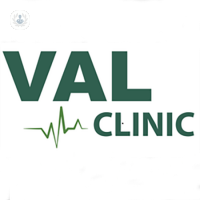What is psoriasis?
Psoriasis is a condition that affects the skin, causing patches of red rash, and flaky patches of silvery skin, which can sometimes be itchy or sore. The condition can present anywhere, but is most common on the scalp, elbows, knees and lower back. It can affect men and women of any age, but is more common in adults under 35 years old. It is non-contagious and the severity differs between people, with some only affected a little, and others affected greatly. Psoriasis is a chronic condition, meaning that it lasts a long time. It usually has periods with mild or no symptoms, followed by periods of more severe symptoms.
You should see a dermatologist if you are suffering with psoriasis.
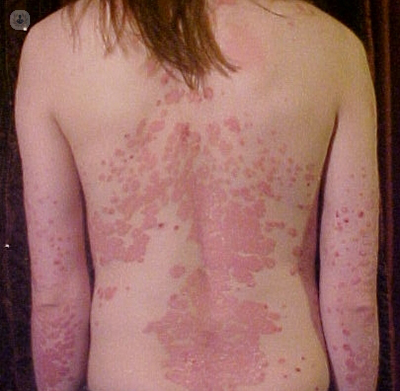
What are the different types?
The most common types of psoriasis are as follows:
Plaque psoriasis
The most common form of psoriasis, and shows as raised, red patches of skin covered with silvery patches of dry skin, known as plaques. Plaques can appear anywhere, but usually appear on elbows, knees, lower back and scalp. The plaques can be sore and itchy, and may crack and bleed in some cases.
Nail psoriasis
The nails are affected in around half of the people with psoriasis. Small dents may appear, and the nails may become discoloured or grow abnormally. The nails can become loose and separate from the nail bed, and in severe cases the nails may crumble.
Guttate psoriasis
This form often starts in childhood, and appears in the form of small, dot like lesions. It is the second most common form of psoriasis. This form often starts after a throat infection, but in most cases will disappear after a few weeks.
Inverse psoriasis
Folds of the skin such as elbows, knees, groin, buttocks and under the breasts are usually affected by this form. It appears as large, red smooth patches, and becomes worse by friction and sweating.
Pustular psoriasis
This is characterised by small, white blisters surrounded by red skin. It is not an infection, or contagious and can affect any part of the body, particularly the hands and feet.
What are the causes of psoriasis?
The cause of psoriasis is unknown, but is due to the skin cells being replaced more quickly than usual, which is possibly a problem with the immune system. The normal process for skin cell production is the production of the new cell in the deeper layers of the skin, the new cells gradually move up through the layers, until they reach the top layer, where they then die and flake off. This usually takes around three to four weeks. With psoriasis, the process only takes three to seven days, causing a build-up of skin cells that are not ready to flake off.
Psoriasis can sometimes be triggered due to injury, stress, smoking, drinking alcohol and certain medications.
What is the treatment for psoriasis?
Mild psoriasis can be treated with skin creams. These can reduce swelling, soreness, itching and reduce the rate of skin cell growth. These may include steroid creams, moisturisers, and coal tar especially in the form of a psoriasis shampoo. More severe forms of psoriasis may be treated with phototherapy. The treatment exposes your skin to ultraviolet light which helps to treat the condition. You may be prescribed a medicine to help cure problems with your immune system that may be leading to psoriasis.
11-13-2012 10-10-2023Psoriasis
What is psoriasis?
Psoriasis is a condition that affects the skin, causing patches of red rash, and flaky patches of silvery skin, which can sometimes be itchy or sore. The condition can present anywhere, but is most common on the scalp, elbows, knees and lower back. It can affect men and women of any age, but is more common in adults under 35 years old. It is non-contagious and the severity differs between people, with some only affected a little, and others affected greatly. Psoriasis is a chronic condition, meaning that it lasts a long time. It usually has periods with mild or no symptoms, followed by periods of more severe symptoms.
You should see a dermatologist if you are suffering with psoriasis.

What are the different types?
The most common types of psoriasis are as follows:
Plaque psoriasis
The most common form of psoriasis, and shows as raised, red patches of skin covered with silvery patches of dry skin, known as plaques. Plaques can appear anywhere, but usually appear on elbows, knees, lower back and scalp. The plaques can be sore and itchy, and may crack and bleed in some cases.
Nail psoriasis
The nails are affected in around half of the people with psoriasis. Small dents may appear, and the nails may become discoloured or grow abnormally. The nails can become loose and separate from the nail bed, and in severe cases the nails may crumble.
Guttate psoriasis
This form often starts in childhood, and appears in the form of small, dot like lesions. It is the second most common form of psoriasis. This form often starts after a throat infection, but in most cases will disappear after a few weeks.
Inverse psoriasis
Folds of the skin such as elbows, knees, groin, buttocks and under the breasts are usually affected by this form. It appears as large, red smooth patches, and becomes worse by friction and sweating.
Pustular psoriasis
This is characterised by small, white blisters surrounded by red skin. It is not an infection, or contagious and can affect any part of the body, particularly the hands and feet.
What are the causes of psoriasis?
The cause of psoriasis is unknown, but is due to the skin cells being replaced more quickly than usual, which is possibly a problem with the immune system. The normal process for skin cell production is the production of the new cell in the deeper layers of the skin, the new cells gradually move up through the layers, until they reach the top layer, where they then die and flake off. This usually takes around three to four weeks. With psoriasis, the process only takes three to seven days, causing a build-up of skin cells that are not ready to flake off.
Psoriasis can sometimes be triggered due to injury, stress, smoking, drinking alcohol and certain medications.
What is the treatment for psoriasis?
Mild psoriasis can be treated with skin creams. These can reduce swelling, soreness, itching and reduce the rate of skin cell growth. These may include steroid creams, moisturisers, and coal tar especially in the form of a psoriasis shampoo. More severe forms of psoriasis may be treated with phototherapy. The treatment exposes your skin to ultraviolet light which helps to treat the condition. You may be prescribed a medicine to help cure problems with your immune system that may be leading to psoriasis.
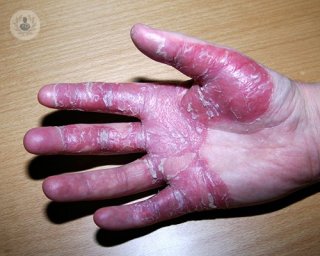

Psoriasis: everything you need to know about this condition
By Dr Gayathri Perera
2024-11-21
Leading London consultant dermatologist, Dr Gayathri Perera explains all about psoriasis, including how you can identify the condition and the possible treatment options. See more
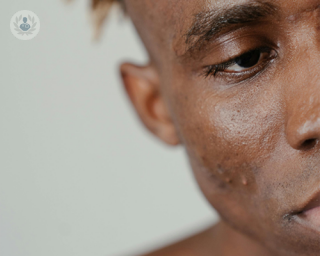

How does stress impact the skin?
By Dr Christina Leitner
2024-11-20
Stress is a common experience in today's fast-paced world, and its effects extend beyond mental health to impact various aspects of physical well-being, including the skin. In this informative article, leading consultant dermatologist Dr Christina Leitner explores how stress can affect the skin and what measures can be taken to mitigate its impact. See more
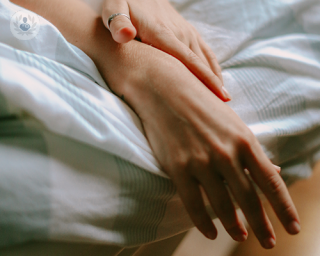

Inflammatory skin diseases explained by a specialist
By Dr Ravi Ratnavel
2024-11-20
Leading dermatologist Dr Ravi Ratnavel shares his professional expertise on inflammatory skin disease, common and uncommon inflammatory skin conditions as well as prevention and treatment. See more
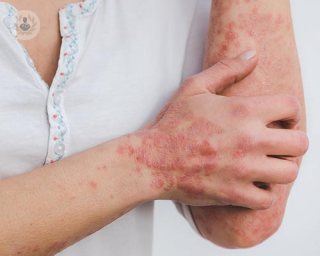

Psoriasis: all bases covered
By Dr Emilia Duarte Williamson
2024-11-20
Statistics demonstrate that psoriasis affects around 2 in 100 people in the UK, often leaving sufferers feeling ashamed and embarrassed about the condition of their skin. Acclaimed consultant dermatologist Dr Emilia Duarte Williamson discusses everything you need to know about the condition, including causes and treatment options. See more
Experts in Psoriasis
-
Dr Gayathri Perera
DermatologyExpert in:
- Skin cancer
- Acne
- Rosacea
- Paediatric dermatology
- Psoriasis
- Autoimmune diseases
-
Dr Ben Esdaile
DermatologyExpert in:
- Psoriasis
- Acne
- Skin cancer
- Paediatric dermatology
- Nail diseases
- Dermoscopy
-
-
Dr Wanda Robles
DermatologyExpert in:
- Laser
- Skin cancer
- Psoriasis
- Skin allergies
- Acne
- Photodynamic therapy
-
Dr Moumita Chattopadhyay
DermatologyExpert in:
- Acne
- Rosacea
- Eczema
- Skin cancer
- Moles
- Lichen sclerosus
- See all

Three Shires Hospital - part of Circle Health Group
Three Shires Hospital - part of Circle Health Group
The Avenue, Northampton NN1 5DR
No existe teléfono en el centro.
By using the telephone number provided by TOP DOCTORS, you automatically agree to let us use your phone number for statistical and commercial purposes. For further information, read our Privacy Policy
Top Doctors

The Winterbourne Hospital - part of Circle Health Group
The Winterbourne Hospital - part of Circle Health Group
Herringston Rd, Dorchester DT1 2DR
No existe teléfono en el centro.
By using the telephone number provided by TOP DOCTORS, you automatically agree to let us use your phone number for statistical and commercial purposes. For further information, read our Privacy Policy
Top Doctors

VAL Clinic
VAL Clinic
39 Frederick Rd, Rainham, RM13 8NJ
No existe teléfono en el centro.
By using the telephone number provided by TOP DOCTORS, you automatically agree to let us use your phone number for statistical and commercial purposes. For further information, read our Privacy Policy
Top Doctors
-
Three Shires Hospital - part of Circle Health Group
The Avenue, Northampton NN1 5DR, NorthamptonExpert in:
- Abdominal ultrasound
- Abdominoplasty
- Acne
- Allergies nose and ears
- Allergy
- Voice disorders
-
The Winterbourne Hospital - part of Circle Health Group
Herringston Rd, Dorchester DT1 2DR, DorchesterExpert in:
- Hip
- Cataracts
- General Surgery
- Orthopaedic surgery
- Physiotherapy
- Knee
-
VAL Clinic
39 Frederick Rd, Rainham, RM13 8NJ, East LondonExpert in:
- Cardiology
- Bariatric Surgery
- Orthopaedic surgery
- Dermatology
- Obstetrics and Gynaecology
- Internal medicine
- See all
- Most viewed diseases, medical tests, and treatments
- Migraine
- Autoimmune diseases
- Joint pain
- Nutrition
- Weight loss injections
- Endermologie
- Polynucleotides
- Bariatric surgery
- Skin biopsy
- One Stop Breast Clinic
